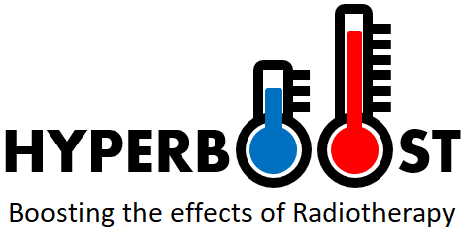Aims
The key aims of the HyperBoost project are to:
1. Train and equip early stage researchers with transferable, multi-disciplinary skills essential in high-end biomedical engineering, clinical hyperthermia and translational oncology (WP2)
2. Obtain and validate new insights into clinical working mechanisms of hyperthermia (WP3)
3. Translate preclinical and clinical results (WP3, WP5) into mathematical relations and treatment planning models (WP4)
4. Apply novel treatment planning models for personalised treatment (WP4) to improve the efficacy of clinical treatments (WP5)
5. Initiate, stimulate and profit from multidisciplinary cross-pollination between the disciplines involved in hyperthermic oncology (WP3-5)
6. Consolidate and expand the European infrastructure and industry for hyperthermia research and clinical application (WP 2-6)
HyperBoost bridges the gap between biology, physics and medicine for Radiotherapy (RT)+Hyperthermia (HT). High quality HT performed at European academic centres yielded a large number of successful RT±HT and Chemotherapy (CH)±HT trials. Further clinical expansion of HT is hindered by three obstacles:
(I) no consensus on optimal treatment schedules for RT+HT
(II) user-dependent quality of HT delivery
(III) need for reliable RT+HT treatment planning to guide use in mainstream clinics
The experience of academic centres is not easily transferred to novice users, impeding wider application of optimally effective HT treatments. Shortage of excellent cross-domain educated HT professionals is recognized as major bottleneck en route to advanced and personalized HT treatment. Strengthening and extending tailored training efforts will deliver the required highly skilled multi-disciplinary researchers crucial to translate complex clinical questions into multi-modality oncological approaches, in turn leading to more clinical applications, benefitting more patients and boosting business opportunities for small/medium enterprise.
The aim of HyperBoost is to train such highly skilled professionals, which will then play an important role in EU health research programmes in aforementioned sectors and disciplines, enhance business thinking & entrepreneurship, stimulating commercial ambition and economic growth in the EU.
These key objectives can only be achieved by close interaction of the academic, industrial and societal partners within the consortium. The different Workpackages of the HyperBoost project are further detailed here.
